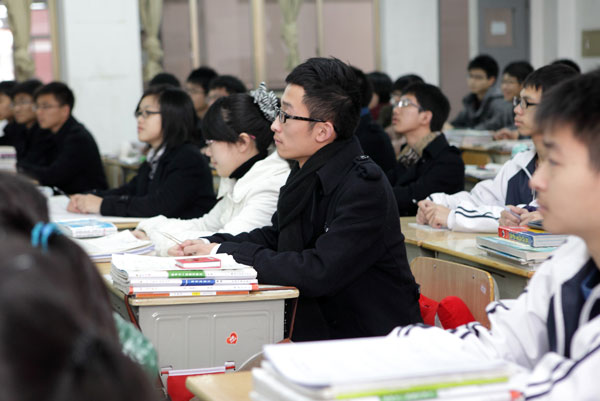Her son was born in Henan and came to Beijng with his parents in 2005. He attended kindergarten and primary school in Beijing, and is now in seventh grade at middle school.
"Some populous provinces, such as Henan and Sichuan, welcome children of migrants with open arms. But Beijing, Shanghai and Guangzhou still offer no solution," she added.
 |
|
Anhui native Liu Peng (right) takes notes in class in a private high school in Zhejiang province. He no longer needs to spend extra time studying textbooks used in his hometown after the province’s new gaokao rules allow students without local hukou to attend the entrance exam in Zhejiang. [LUO SHANXIN / FOR CHINA DAILY] |
People who are against allowing children of migrant workers to take the entrance exam with local children argue that it will cause more people to flood into the big cities, while metropolises such as Beijing and Shanghai are already overloaded and cannot handle more newcomers.
Sun Xiaobing, director of policy and regulation at the Ministry of Education, said on Jan 17 that Beijing's policy is a transitional one, and will improve step by step.
A 43-year-old father living in Shanghai, who gave his name only as Zhou for fear of reprisals from fellow residents, said he is far more anxious.
His 14-year-old son is in the eighth grade and will face the high school entrance exam in 2014.
"We're desperate. The new policy looks at parents' backgrounds, instead of children's ability. It is so unfair," said the native of Anhui province.
"We came to a better place, seeking a better life, but this migrant tag not only sticks with us, but also with our children.
"Children's education problems are a burden to our families," said the father.
"Sometimes we enjoy our family time, but once the idea of school problems pops up, the delightful atmosphere is gone without trace and we feel doomed."
China's hukou system, or household registration system, restricts children to attending schools in their home provinces. A regulation amended the restriction in 2003 by allowing children of migrants to receive nine-year compulsory education in cities where their parents work.
But under such policies, migrant children had to either return to their home provinces for further schooling or risk dropping out of school if they chose to stay with their parents in the cities where they work.
The policies have sparked mounting protests in recent years. As a consequence, the new gaokao rules were issued in 2012 as a major effort by the central government to provide equal rights in education and matriculation opportunities for those children, a group that is increasing due to the country's rapid urbanization.
Local requirements — loose or strict — mostly depend on a city's migrant population and the competitiveness of students, policy professor Li Chang'an said.
He believes that in less developed areas, such as Qinghai and Tibet, officials are still considering how to avoid opening the gaokao to migrants.
"If migrant children are allowed to take the gaokao in those regions, most of them could take opportunities away from local students to attend better universities because they have received better education in developed areas," he said.
Also, the rather harsh requirements in Beijing are a way to protect native students, said a teacher at a senior high school in the capital who asked to be identified as Yang.
She was referring to the fact that students who take the exam in Beijing can qualify for the city's colleges with lower scores than if they took it in other provinces.
"Nearly 70 percent of the students in our school have to go to vocational schools for further study every year," she said. "The city's new policy for migrant children will surely give those local students fewer choices in the future."
Analysts say such conflicts are triggered by an uneven distribution of education resources, which cannot be solved by the new gaokao rules.
As part of State policy to solve the education equity problem, Tan Songhua said the less-developed areas, with fewer education resources, will receive more benefits, such as more slots for students entering prestigious universities.
The recruitment plan already leans toward central and western areas, giving more opportunities to students there.
Last year, universities included in Project 211 distributed 10,000 recruitment opportunities to high poverty counties.
Project 211 involves about 100 universities that receive extra investment and attention from the State as they are considered good universities.
"Another effective way to tackle the gaokao problem is to give more supportive policies to upgrade education resources in less developed regions, such as build more top-class schools," Li Chang'an said.
"If there were top universities like Peking University and Tsinghua University in western regions, would migrant students still rush to Beijing?" he said.
Contact the writers at luowangshu@chinadaily.com.cn and jinzhu@chinadaily.com.cn
